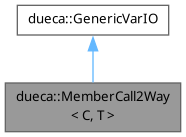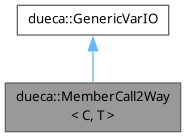Template specialisation of the GenericVarIO. More...
#include <MemberCall2Way.hxx>


Public Member Functions | |
| MemberCall2Way (bool(C ::*c)(T &, bool in)) | |
| Constructor. | |
| bool | poke (void *obj, const T &v) const |
| Call the member function with data. | |
| bool | peek (void *obj, T &v) const |
| Obtain data from the class object. | |
 Public Member Functions inherited from dueca::GenericVarIO Public Member Functions inherited from dueca::GenericVarIO | |
| GenericVarIO () | |
| constructor | |
| virtual | ~GenericVarIO () |
| destructor | |
| ProbeType | getType () const |
| returns the argument type required | |
| DECLARE_IN_GENERICVAR_IO (int) | |
| Use handy macro to declare stuff for int. | |
| DECLARE_IN_GENERICVAR_IO (uint32_t) | |
| Use handy macro to declare stuff for int. | |
| DECLARE_IN_GENERICVAR_IO (uint16_t) | |
| Use handy macro to declare stuff for int. | |
| DECLARE_IN_GENERICVAR_IO (double) | |
| Use handy macro to declare stuff for double. | |
| DECLARE_IN_GENERICVAR_IO (float) | |
| Use handy macro to declare stuff for float. | |
| DECLARE_IN_GENERICVAR_IO (bool) | |
| Use handy macro to declare stuff for bool. | |
| DECLARE_IN_GENERICVAR_IO (TimeSpec) | |
| Use handy macro to declare stuff for TimeSpec. | |
| DECLARE_IN_GENERICVAR_IO (PeriodicTimeSpec) | |
| Use handy macro to declare stuff for PeriodicTimeSpec. | |
| DECLARE_IN_GENERICVAR_IO (PrioritySpec) | |
| Use handy macro to declare stuff for PrioritySpec. | |
| DECLARE_IN_GENERICVAR_IO (vstring) | |
| Use handy macro to declare stuff for vstring. | |
| DECLARE_IN_GENERICVAR_IO (SCM) | |
| Use handy macro to declare stuff for SCM. | |
| DECLARE_IN_GENERICVAR_IO (vector_int) | |
| Use handy macro to declare stuff for vector<int> | |
| DECLARE_IN_GENERICVAR_IO (vector_float) | |
| Use handy macro to declare stuff for vector<float> | |
| DECLARE_IN_GENERICVAR_IO (vector_double) | |
| Use handy macro to declare stuff for vector<double> | |
| DECLARE_IN_GENERICVAR_IO (vector_vstring) | |
| Use handy macro to declare stuff for vector<vstring> | |
| DECLARE_IN_GENERICVAR_IO (ScriptCreatable) | |
| Objects creatable from scripts. | |
| DECLARE_IN_GENERICVAR_IO (string8) | |
| Dstring8. | |
| DECLARE_IN_GENERICVAR_IO (string16) | |
| Dstring. | |
| DECLARE_IN_GENERICVAR_IO (string32) | |
| Dstring. | |
| DECLARE_IN_GENERICVAR_IO (string64) | |
| Dstring. | |
| DECLARE_IN_GENERICVAR_IO (string128) | |
| Dstring. | |
Additional Inherited Members | |
 Protected Attributes inherited from dueca::GenericVarIO Protected Attributes inherited from dueca::GenericVarIO | |
| ProbeType | ptype |
| type of argument passed/inserted/read | |
Detailed Description
class dueca::MemberCall2Way< C, T >
Template specialisation of the GenericVarIO.
The MemberCall2Way takes a pointer to a member function of simple shape, and with that information and a pointer to an object in that class it can call the member function.
One common use is accepting Scheme or Python (helper) objects in your class. Suppose that you have made a class MyHelper creatable to Scheme, by deriving it from the dueca::ScriptCreatable class. Then in Scheme code you can create the helper, and pass it on to your (module) class:
The same in Python:
To process the setting of the helper, you add an entry to your ParameterTable:
The setHelper call should accept a ScriptCreatable, then check whether it is really a MyHelper object, and keep a reference to the MyHelper object.
DUECA objects (Modules and ScriptCreatable helpers) use intrusive ref counting. In your module, you may for example define a ref pointer to keep a reference to the helper:
The function to accept the helper can be written as:
Note that the helper object has been created in the script language; object ownership is therefore by the script. Any helper objects (also ones you don't use in the end), will be made dependent on the modules you attached them to, so garbage collection will only kick in when both the helper and module objects in the above scripts are cleared.
Constructor & Destructor Documentation
◆ MemberCall2Way()
| dueca::MemberCall2Way< C, T >::MemberCall2Way | ( | bool(C ::* | c )(T &, bool in) | ) |
Constructor.
- Parameters
-
c A pointer to a member function, with signature This function must accept the value in T when the variable "in" is true (into the class), or return the value of T when "in" is false (out of the class).bool C::function(T&, bool in).
The documentation for this class was generated from the following file:
- /home/abuild/rpmbuild/BUILD/dueca-4.2.5-build/dueca-4.2.5/dueca/MemberCall2Way.hxx